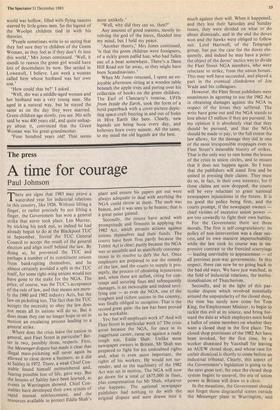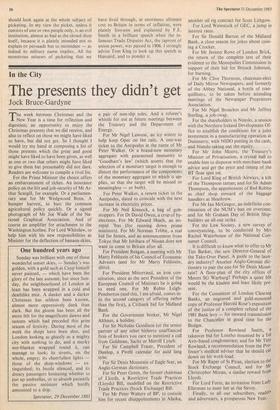The press
A time for courage
Paul Johnson
?There are signs that 1983 may prove a
watershed year for industrial relations in this country, like 1926. Without lifting a finger, or rather precisely by not lifting a finger, the Government has won a general strike that never took place. Len Murray, by sticking his neck out, as indeed he had already begun to do at the Blackpool TUC in September, forced the TUC General Council to accept the result of the general election and align itself behind the law. By doing so, he prevented the TUC and perhaps a number of its constituent unions from bankrupting themselves, and he almost certainly avoided a split in the TUC itself, for some right-wing unions would not have gone to the stake for the NGA. The price, of course, was the TUC's acceptance of the rule of law, and that means not mere- ly the 1980 and 1982 industry Acts, but the law on picketing too. The fact that the TUC accepts the necessity to obey the law does not mean all its unions will do so. But it does mean they can no longer hope to set in motion an escalating process leading to a general strike.
Where does the crisis leave the nation in general, and Fleet Street in particular? Bet- ter in two, possibly three, respects. First, the Messengerdispute has made it clear that Illegal mass-picketing will never again be allowed to close down a business, as it did at Saltley in 1972. There, a weak Chief Con- stable found himself outnumbered and, fearing possible loss of life, gave way. But the lessons of Saltley have been learned, as events in Warrington showed. Chief Con- stables have developed their own system of rapid mutual reinforcement, and the resources available to protect Eddie Shah's
plant and ensure his papers got out were always adequate to deal with anything the NGA could throw at them. The mob was beaten, and it was seen to be beaten; that is a great point gained. Secondly, the courts have acted with promptitude and firmness in applying the 1982 Act, which permits actions against unions themselves and their funds. The courts have been firm partly because the Tebbit Act is clear; partly because the NGA was so unsubtle and so manifestly contemp- tuous in its resolve to defy the Act. Once employers are prepared to use the remedy of the law, and the courts to supply it pro- mptly, the process of obtaining injunctions and, when these are defied, citing for con- tempt and securing fines and subsequently damages, is an inexorable and indeed terri- fying one — as even the NGA, one of the toughest and richest unions in the country, was finally obliged to recognise. That is the second great gain: the law has been proved to be workable.
Yes: but will employers work it? And will Fleet Street in particular work it? The crisis arose because the NGA, for once in its juggernaut career, came up against a really tough nut, Eddie Shah. Unlike most newspaper owners in Britain, Mr Shah was prepared to fight for his undoubted rights and, what is even more important, the rights of his workers. He would not sur- render, and so the machinery of the 1982 Act was set in motion. The NGA will now go down for a total of £675,000 in fines, plus compensation for Mr Shah, whatever else happens. The national newspaper publishers had nothing to do with the original dispute and were drawn into it much against their will. When it happened, and they lost their Saturday and Sunday issues, they were divided on what to do about dismissals, and in the end the doves won and the hawks were obliged to follow suit. Lord Hartwell, of the Telegraph group, has put the case for the doves elo- quently, and indeed he may have a point: the object of the doves' tactics was to divide the Fleet Street NGA members, who were reluctant to strike, from the union bosses. This may well have succeeded, and played a part in the eventual climbdown of Joe Wade and his colleagues.
However, the Fleet Street publishers were unanimous in agreeing to use the 1982 Act in obtaining damages against the NGA in respect of the losses they suffered. The writs have gone out and the NGA stands to lose about £3 million if they are pursued. In my opinion it is absolutely vital that they should be pursued, and that the NGA should be made to pay, to the full extent the law allows, for the damagc they did in one of the most irresponsible stoppages even in Fleet Street's miserable history of strikes. That is the only way to ram home the lesson of the crisis in union circles, and to ensure that it does not happen again. So I trust that the publishers will stand firm and be united in pressing their claims. They must do so, in fact, in their own interests, for if these claims are now dropped, the courts will be very reluctant to grant national newspapers injunctions in the future. It is no good the police being firm, and the courts prompt, if the newspaper owners chief victims of excessive union power are too cowardly to fight their own battles.
For the Government there are three morals. The first is self-congratulatory: its policy of non-intervention was a clear suc- cess, and its own massive imperturbability while the law took its course was in im- pressive contrast to the frenzied scurryings — leading unevitably to appeasement — of all previous post-war governments. In this respect, there can now be no going back to the bad old ways. We have just watched, in the field of industrial relations, the institu- tionalisation of Thatcherism.
Secondly, and in the light of this par- ticular dispute which revolved essentially around the unpopularity of the closed shop, the time has surely now come for Tom King, the Employment Minister, to begin to tackle this evil at its source, and bring for- ward the date at which employers must hold a ballot of union members on whether they want a closed shop in the first place. The closed shop provisions of the 1982 Act have been invoked, for the first time, by a worker dismissed by Vauxhall for leaving an AUEW closed shop, and whose case for unfair dismissal is shortly to come before an industrial tribunal. Clearly, this aspect of the Government's legislation is going to be the next great test, for once the closed shop system begins to unravel, the era of union power in Britain will draw to a close.
In the meantime, the Government should not forget those disgraceful scenes outside the Messenger plant in Warrington, and should look again at the whole subject of picketing. In my view the picket, unless it consists of one or two people only, is an evil institution, almost as bad as the closed shop itself, because it is plainly intended not to explain or persuade but to intimidate — as indeed its military name implies. All the monstrous misuses of picketing that we have lived through, at enormous ultimate cost to Britain in terms of inflation, were plainly foreseen and explained by F.E. Smith in a brilliant speech when the in- famous Trade Disputes Act, the taproot of union power, was passed in 1906. I strongly advise Tom King to look up this speech in Hansard, and to ponder it.















































 Previous page
Previous page